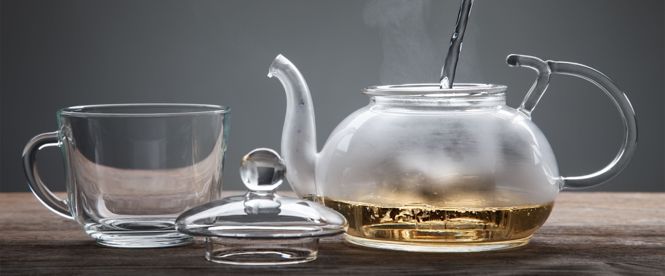THE SECRET OF TEA LIES IN THE WATER
Gong fu cha – the name of the Chinese tea ceremony means above all perfection, which can only be achieved through intensive practice and many years of experience. Jens de Gruyter has both when it comes to tea. As founder, creative director and CEO of the Berlin-based company Paper & Tea, he himself pursues this ultimate goal of a tea master: perfect preparation. His experience shows: If you want to get the best out of tea, you should also pay attention to water. And with it its degree of hardness, mineral content and taste. Not every tap water has what it takes to make the perfect tea water …
THE FATHER OF TEA
Tea consists of 98 percent water, it is virtually born from water. It is not for nothing that a Chinese proverb says “Water is the mother of tea”, smiles Jens de Gruyter. When you see him standing in the middle of his concept store in Berlin-Charlottenburg, as he is doing right now, you can’t help the impression that you have just met the father of tea. A tall man, a man at peace with himself, with a sense of beauty and detail – and the face of this store leaves no doubt about that. And unquestionably for tea. Here he appears in almost supernatural form. Exquisite. Sophisticated. Mysterious. At the latest when your gaze wanders in wonder at the displays from China, Japan, Korea, Sri Lanka or India, it dawns on you: there is so much more to the preparation and enjoyment of tea than you think.

THE RIGHT TEMPERATURE, THE RIGHT DRAWING TIME
Creating a bigger stage for the speciality tea – with this mission Jens de Gruyter founded Paper & Tea in 2011. “For me, tea is the most fascinating and multi-faceted product that mankind has ever invented. You can’t do it justice by simply pouring boiling water over a tea bag.” He said that boiling water is difficult to do at all. Because in addition to the mineral content of water and thus its hardness, water temperature and infusion time in tea preparation are also decisive factors that must be kept in balance. It is actually clear that impatience and carelessness are out of place. Because each type of tea prefers to develop in its own temperature and time spectrum due to different degrees of oxidation. Green and white teas like lower brewing temperatures between 65 and 80 °C. Ulongs show what they can really do between 80 and 90°C, black teas like Assam and Darjeeling between 90 and 100°C. However, Jens de Gruyter recommends never brewing tea with boiling water in favour of a gentler extraction, so that the tea does not taste too bitter.
As a general rule, the higher the water temperature during scalding, the shorter the infusion time. The lower the temperature, the longer a tea can brew. A high water temperature changes the taste profile of a tea, because it weakens the amino acids in it and in return the rather tart and bitter tannins come to the fore. If the water is less hot and softer, the more floral flavours can be tasted.

TAP WATER BEST MEDIUM MINERALIZED
The perfect tea water is fresh, pure and rich in oxygen. Minerals such as sodium, calcium, hydrogen carbonate and magnesium give it its own individual character, which are beneficial to tea in moderation, Jens de Gruyter knows. “Water is at least as multi-faceted as tea, except that most people don’t give it much thought. Tea is also a good medium to understand water better.” Ideally, it should be a medium mineralized water. Rather low in calcium and sodium, preferably rich in magnesium. The minerals are responsible for transporting the taste and intensify it the more dense they are. If they get the upper hand, the more delicate flavours of the tea hardly have a chance to assert themselves. However, Jens de Gruyter warns that almost distilled water is not a solution when preparing tea: “Barely mineralized water makes the tea taste flat and boring. Unfortunately, perfect tea water rarely flows from the tap. In Jens de Gruyter’s adopted home of Berlin, for example, tap water generally contains a lot of lime. With an average of 14° dH, it is very hard and far from the ideal water hardness for an infusion drink like tea, which is between 7 and 8° dH. For Jens de Gruyter, filtering and treating the water is essential here and also at other taps: “If you want to get the best out of a good tea, you should soften extremely calcareous water and mineralise water that is too soft accordingly. You will taste the difference.”
LET’S GET TEA DRUNK
Jens de Gruyter, who grew up partly in Canada, came to tea through his godfather, a tea merchant who sowed the appreciation for high quality tea in the family. Tea became the elixir of life, the habitus, the revitalizer and recalibrator. And Jens de Gruyter became a passionate “Tea Guy” who wants to help people “live a healthier, more creative and fulfilling life”. “The way you feel about good tea is great. It relaxes and invigorates you at the same time,” he says, who likes to start his day with green tea from Japan. Jens de Gruyter is certain that his wallflower existence has long been put behind him. Instead, he is now preparing to emancipate himself from his banalisation by the industry. Tea Time has once again become part of a modern, urban, not least mindful lifestyle in which there is space and time for the small, fine details that make a cup of tea an experience. Or, as the old tea masters would certainly have put it: Let’s get tea drunk!

LUQEL WATER STATION
LUQEL offers finely balanced recipes for tea water that are perfectly suited to all types of tea and bring out their specific flavours to the full.

